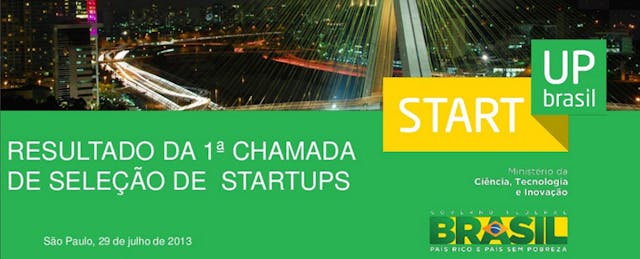The Brazilian edtech industry is really sprouting. Last week, the government announced 56 startups that will be taking part in Start-Up Brasil, a program launched by the federal government to accelerate the development of new companies (started within the last three years) and bring their innovative products to the market. (Read more about the program here.) Of the 56 companies chosen, 11 are working in education, making up nearly 20% of all accepted companies and out-representing the retail (14.3%), events and tourism (9%), health (9%) and financial (9%) industries.
Applicants were selected according to four different criteria, most important of which was the business model where factors like scalability, relevance and attractiveness were considered. Then, judges evaluated the solution brought by the proposal, considering innovation, technical consistency, and effectiveness in tackling problems. The last two criteria dealt with the team with regards to their education and experience, along with their motivation.
Among edtech startups, nine are Brazilians and two are from the US. They offer a wide range of products and services, from online platforms that teach how to code or speak in a foreign language. "It reflects a moment of effervescence of this market, which is offering many opportunities," said Felipe Matos, Start-Up Brasil's COO.
Here are the eleven edtech startups. (The first two are from the U.S.)
-
EduSynch: "Brazil's first digital self-assessment tool" offers a platform that allows students to assess their own proficiency on subject matters.
-
Kudo Learning: Mobile language-learning solutions for young kids.
-
AppProva: Game that allows high school students to study for admission tests for universities. The app is available for smartphones and tablets.
-
Aulalivre: Website that offers free courses to help students prepare for admission exams for universities. There are currently more than 100 video classes spanning all high school disciplines.
-
EADBox: Online platform that allows anyone to sell or attend courses.
-
Easyaula: Online platform where users can attend or offer classes, lectures and workshops (upon review and approval by Easyaula staff). Macmillan Digital Education invested in Easyaula back in February.
-
EvoBooks: Digital publisher that offers classes, e-books and 3D learning tools, among other products.
-
Kiduca: Online platform that simulates a real city where students can virtually walk and learn subjects across different disciplines.
-
MobGeek: Online platform that teaches students how to code with video classes offered in Portuguese.
-
Mundo de Aventura: Developer of mobile games where kids can develop skills like memory, attention, and problem-solving abilities.
-
Profes: Website that connects students to private tutors.
Start-Up Brazil received 908 submissions (672 from Brazil, 236 from other countries) and 45 Brazilian projects and 11 foreign projects were selected. See the complete list here.
Each company will receive up to R$ 200,000 (approximately $87,000 in U.S. dollars) from Start-Up Brazil and participate in one of nine accelerator programs affiliated with Start-Up Brazil. With offices throughout Brazil, these programs will provide physical space, legal advice and mentorship, among other services. These accelerators will also invest up to an additional R$ 20,000 to R $1 million ($8,700 to $435,000 in U.S. dollars) in return for equity, to be negotiated on a case by case basis.
The Brazilian government is also opening up an office in the Silicon Valley to connect its startups to the tech community and resources there.


